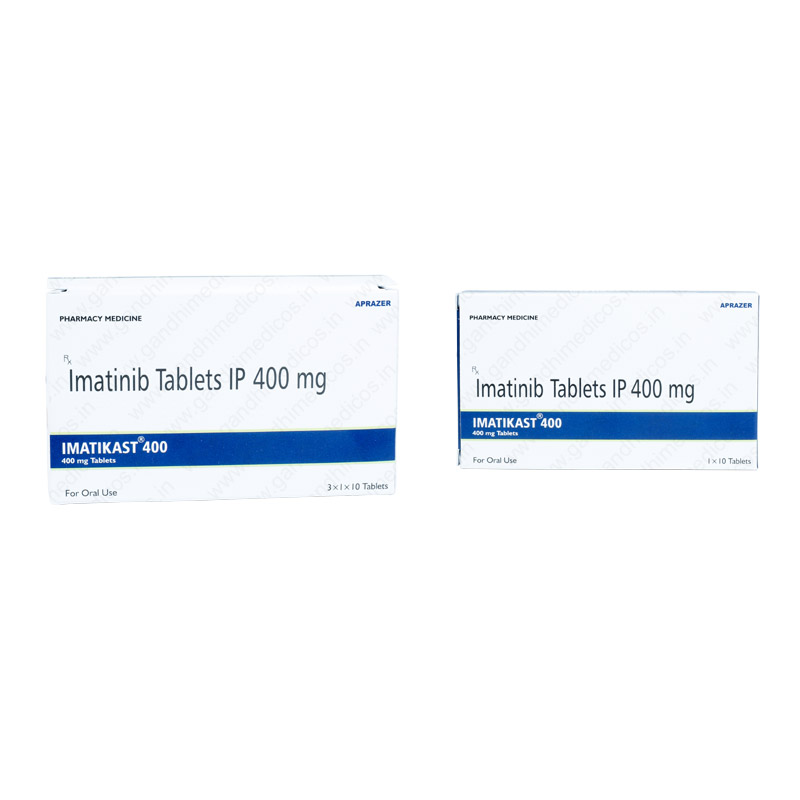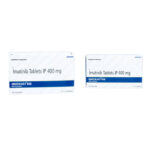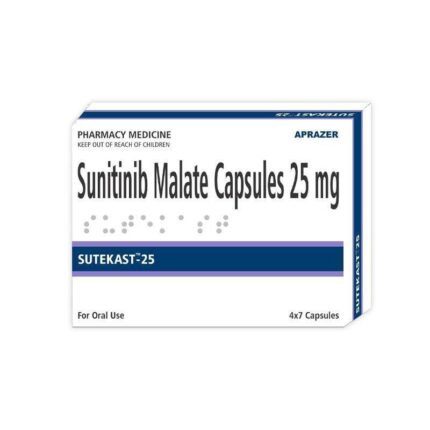Imatikast (Imatinib 400 mg)
Imatikast (Imatinib 400 mg), the indigenous drug, is used for patients with different types of blood cancer caused due to irregular growth of white blood cells (WBCs). Imatikast 400-800 mg (Imatinib) hinders the growth of these abnormal cells and induces the mechanism of self-destruction (apoptosis) in them. Imatinib 400 mg is useful in patients suffering from different types of blood cancers like,
- Chronic myeloid leukemia (CML)
- Adult acute lymphoblastic leukemia (ALL)
- Chronic Eosinophilic Leukemia (CEL)
- Aggressive systemic mastocytosis (ASM)
- Myelodysplastic/Myeloproliferative Diseases (MDS/MPD)
Additionally, it is also used in patients with tumors of the stomach and small intestine [Gastrointestinal stromal tumor (GIST)] and tumors that occurs in the profound layers of the skin such as muscles, fat layer, and skin [Dermatofibrosarcoma protuberans (DFSP)].
Imatikast (Imatinib 400 mg) was developed in the late 90s when abnormal chromosome gene type (bcr-abl tyrosine kinase protein) was identified. The gene is responsible for causing chronic blood cancer, wherein the bone marrow produces too many WBCs leading to their over-crowding and dearth of other blood cells (RBCs and platelets). Imatinib 400 mg is an inhibitor drug that works its action by stopping the growth of these bcr-abl proteins.
Administration of Imatikast (imatinib):
The oral dosage of Imatikast varies based on the type of cancer. Table 1 shows the recommended dosage of Imatinib 400 mg based on the disease type. It is a readily-absorbable drug with more than 98% absorption rate (bioavailable) in our body. It is metabolized in the liver and distributed throughout the region affected by cancer. Once the Imatinib completes its action, more than 81% of the dose is expelled within 7 days.
Table 1: Recommended dosage of Imatikast (imatinib)
| Type of disease | Recommended dosage (mg/day) |
| CML | 400 or 600 |
| ALL | 600 |
| CEL | 100 or 400 |
| ASM | 100 or 400 |
| MDS/MPD | 400 |
| GIST | 400 |
| DFSP | 800 |
?
When should Imatikast (Imatinib 400 mg) be avoided?
- When patients are planning to get pregnant or is currently pregnant
- When patients gain unexpected weight due to sorefekast or any other drug leading to the risk of swelling and unwanted fluids in the body
- Dosing should be immediately reduced if RBC or WBC count reduces (anemia, neutropenia, and thrombocytopenia) in the weekly or monthly blood testing
- If the patients have severe risk or history of heart disease (heart failure or left ventricular dysfunction), their heart rate should be checked regularly and dosing should be adjusted accordingly
- If patients are suffering from the severe loss of blood (hemorrhage)
- If patients have a high risk of liver damage due to chemical components in the drug (severe hepatotoxicity)
- If patients have serious problems like the formation of holes in the stomach or small intestine (Gastrointestinal perforations)
- If patients are presented with different forms of skin reactions (Stevens-Johnsons syndrome and erythema multiforme)
- In patients with toxicities of liver, heart, kidney or immunity, the dosage needs to be adjusted based on the given conditions
Most common side-effects of Imatikast (Imatinib 400 mg):
According to clinical trials, more than 10% of patients were seen with these side effects,
- Swelling in the affected regions (edema)
- Nausea
- Vomiting
- Pain and cramps in the muscles
- Stomach infections and diarrhoea
- Excessive tiredness
- Pain in the lower back
- Rashes
Dosage of Imatikast (Imatinib 400 mg):
If patients are taking an 800 mg dose, they should consume a 400 mg tablet 2 times a day for reducing the risk of increased iron in the body. However, the dosages of 400 or 600 mg can be taken once in a day. Grapefruit juice should be completely avoided while taking Imatinib as it is known to cause severe side-effects.

 Hepatitis C
Hepatitis C HIV
HIV Transplant Medicine
Transplant Medicine Respiratory System
Respiratory System














Reviews
There are no reviews yet.